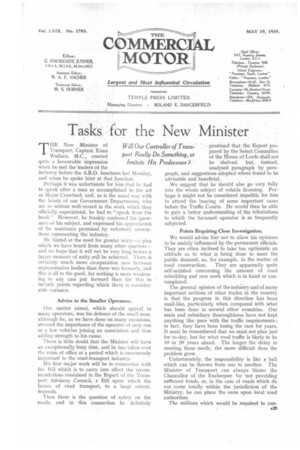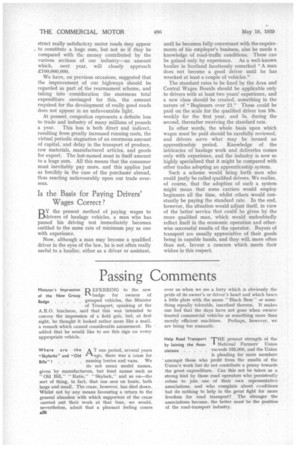Tasks for the New Minister
Page 27

Page 28

If you've noticed an error in this article please click here to report it so we can fix it.
THE New Minister Of Transport, Captain Enan Wallace, M.C., created quite a favourable impression when lie met the leaders of the industry before the A.R.O. luncheon last Monday, and when he spoke later at that function.
Perhaps it was unfortunate for him that he had to speak after a Man so accomplished in the art as Major Crawfurd, and, as is the usual way with the heads of our Government Departments, who are so seldom well-versed in the work which they officially superintend, he had to "speak from the book." However, he frankly confessed his ignoranceof his subject, and expressed his appreciation of the assistance promised by voluntary associations representing the industry.
He hinted at the need for greater unity—a plea which we have heard from many other quarters— and we hope that it will not be very long before a larger measure of unity will be achieved. There is certainly much more co-operation now between representative bodies than there was formerly, and this is all to the good, for nothing is more weakening to any case put forward than for this to include points regarding which there is considerable variance.
Advice to the Smaller Operators.
One matter raised, which should appeal to many operators, was his defence of the small man, although he, as we have done on many occasions, stressed the importance of the operator of only one or a few vehicles joining an association and thus adding strength to his cause.
There is little doubt that the Minister will have an exceptionally busy time, and he has taken over the reins of office at a period which is enormously important to the road-transport.industry.
His first major work will be in connection with the Bill which is to carry into effect the recommendations contained in the Report of the Transport Advisory Council, a. Bill upon which the future of road transport, to a large extent, depends.
Then there is the question of safety on the roads, and in this connection he definitely promised that -the Report prepared by the Select Committee• of the House of Lords shall not be shelved, but, instead, analysed paragraph by paragraph, and suggestions adopted where found to be advisable and beneficial.
We suggest that he should also go very fully into the whole subject of vehicle licensing. Perhaps it might not be considered impolitic for him to attend the hearing of some important cases before the Traffic Courts. He would then be able to gain a better understanding of the tribulations to which the harassed operator is so frequently subjected.
Points Requiring Close Investigation.
We would advise him not to allow his opinions to be unduly influenced by the permanent officials. They are often inclined to take too optimistic an attitude as to what is being done to meet the public demand, as, for example, in the matter of road construction. They are apparently quite self-satisfied concerning the amount of road rebuilding and new work which is in hand or contemplated.
The general opinion of the industry and of many important sections of other trades in the country is that the progress in this direction has been snail-like, particularly when compared with what has been done in several other countries. Our main and subsidiary thoroughfares have not kept anything like pace with the traffic requirements ; in fact, they have been losing the race for years. It must be remembered that we must not plan just for to-day, but for what road traffic is likely to be 10 or 20 years ahead. The longer the delay in meeting these needs, the more difficult does the problem grow.
Unfortunately, the responsibility is like a ball which can be thrown from one to another. The Minister of Transport can always blame the Chancellor of the Exchequer for not providing sufficient funds, or, in the case of roads which do not come totally within the jurisdiction of the Ministry, he can place the onus upon local road authorities.
The millions which would be required to con struct really satisfactery motor roads may appear to constitute a huge sum, but not so if they be compared with the money contributed by the various sections of our industry—an amount which, next year, will closely approach £100,000,000. We have, on previous occasions, suggested that the improvement of our highways should be regarded as part of the rearmament scheme, and taking into consideration the enormous total expenditure envisaged for this, the amount required for the development of really good roads does not appear in an unfavourable light. At present, congestion represents a definite loss to trade and industry of many millions of pounds a year. This loss is both direct and indirect, resulting from greatly increased running costs, the virtual periodic stagnation of an enormous amount of capital, and delay in the transport of produce, raw materials, manufactured articles, and goods for export. The last-named must in itself amount to a huge sum. All this means that the consumer must inevitably pay more, and this applies just as forcibly in the case of the purchaser abroad, thus reacting unfavourably upon our trade overseas.
Is the Basis for Paying Drivers' Wages Correct?
BY the present method of paying wages to drivers of haulage vehicles, a man who has passed his driving test immediately becomes entitled to the same rate of minimum pay as one with experience. Now, although a man may become a qualified driver in the eyes of the law, he is not often really useful to a haulier, either as a driver or assistant, until he becomes fully conversant with the requirements of his employer's business, also he needs a knowledge of road-traffic conditions. These can be gained only by experience. As a well-known haulier in Scotland facetiously remarked "A man does not become a good driver until he has wrecked at least a couple of vehicles." The standard rates to be fixed by the Area and Central Wages Boards should be applicable only • to drivers with at least two years' experience, and a new class should be created, something in the nature of "Beginners over 21." These could be paid on the scale for the qualified driver less Ms. weekly for the first year, and 5s. during the second, thereafter receiving the standard rate. In other words, the whole basis upon which wages must be paid should be carefully reviewed, and drivers serve what may be termed an apprenticeship period. Knowledge of the intricacies of haulage work and deliveries comes only with experience, and the industry is now so highly specialized that it might be compared with other trades adopting an apprenticeship system. Such a scheme would bring forth men who could justly be called qualified drivers. We realize, of course, that the adoption of such a system might mean that some carriers would employ beginners all the time, whilst others would constantly be paying the standard rate. In the end, however, the situation would adjust itself, in view of the better service that could be given laY the more qualified man, which would undoubtedly reflect itself in the economic operation and otherwise successful results of the operator. Buyers of transport are usually appreciative of their goods being in capable hands, and they will, more often than not, favour a concern which meets their wishes in this respect.




















































































